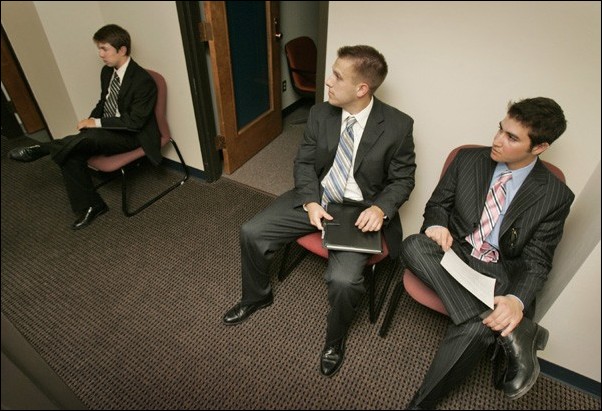Capped, gowned and hired
KRT
Image: Capped, gowned and hired:Dressed for success, University of Kansas students Brandon Trice (from left), Tom O’Dea and Ari Shapiro waited for job interviews last month at the University Career Center in Lawrence, Kansas. Experts say many companies are offering incentives to new gr:
May 24, 2006
KANSAS CITY, Mo. – Tom O’Dea dressed for the hunt.
His tie, perfectly knotted, lay neatly over the buttons on his pressed white shirt. His buffed black shoes complemented his charcoal-gray suit.
The 22-year-old Overland Park, Kan., resident had gone to the University of Kansas Career Center in April seeking something college career counseling specialists say is plentiful this year -employment.
“I hear there are a lot of available jobs out there,” said O’Dea, a marketing major.
In fact, the National Association of Colleges and Employers, which has monitored employment availability for college graduates for half a century, reports that the class of 2006 will graduate into the best job market in six years.
With a flood of baby boomers retiring, an economy on the rebound from the post-Sept. 11 slump and a technology upturn after the 2000 dotcom bust, employers nationwide project they will hire nearly 15 percent more college graduates this year than a year ago. And many of this year’s hires will be paid more, too.
Major employers of new college graduates, such as Enterprise Rent-A-Car and Lockheed Martin, project they will fill, respectively, 7,000 and 4,400 entry-level positions with new graduates this year.
In the Kansas City area, Cerner Corp. spokeswoman Kelli Christman said “more than 50 percent of the company’s new hires are entry-level associates who are newly graduated.” Cerner recruiters, she said, reported stiff competition this year among employers trying to attract the best graduates.
“We already have started seeing companies offering sign-on bonuses and higher compensation packages,” said Pam Webster, corporate recruiting manager for Enterprise.
University career centers in Missouri and Kansas saw evidence this spring of employers aggressively seeking to fill a profusion of positions.
“We have seen a bit of an increase in recruiters or employers coming on campus for career fairs,” said Amanda Nell, director of employee relations at the University of Missouri-Columbia Career Center. “But mostly what we noticed was that this year a greater number of job opening postings came through our career center.”
KU career center workers also saw heightened employer interest. Last year there were 100 employers at the spring career fair, and this year in February there were about a third more, said David Gaston, center director. As late as April 19, companies such as Coca-Cola and Liberty Mutual were interviewing students at KU.
Lillian Kang, 21, of Overland Park, Kan., found a lot of job opportunities at the KU career fairs. But she ended up landing a financial adviser position with High Pointe Financial Group.
“They found me,” Kang said. “They saw my resume posted on the KU career site and called me.”
At the University of Missouri-Kansas City Career Services Center, employers still were calling recently to reach potential employees even though traditionally the college campus recruiting season ends at the beginning of April, said Annette Haynes, UMKC manager of career services.
MU career center officials expect more students to graduate with jobs this year than in the last two years. In late spring 2005, some 84 percent of the 2,050 MU graduates who responded to an online survey left college with jobs. Most of those jobs – 75 percent – were in Missouri and paid salaries ranging from $24,000 to $47,200.
Nationally, most job offers are being made to students graduating with degrees and skills in financial services, accounting, engineering and computer services.
Tony Goss, 22, who graduated recently from UMKC with a bachelor’s degree in business administration, found out in April he would be working for Sprint as a financial analyst. He already was working with First National Mortgage Sources in Overland Park, but an offer from Sprint nearly doubled his salary.
“When I got that offer, I was jumping around like a 5-year-old,” said Goss, of Weatherby Lake, Mo.
Besides its more optimistic hiring forecast for this year’s graduates, the National Association of Colleges and Employers found in its 2006 survey of employers that starting salaries will be better, too, particularly in certain fields.
Strong competition for the best graduates has driven starting salaries up in the hottest fields: engineering and business. A good student with a degree in accounting is looking at an annual starting salary of more than $46,000, a jump of more than 5 percent over last year. And in almost every engineering field, starting salaries rose by 4 to 5 percent. Liberal arts salaries are up this year by more than 6 percent.
Besides the demographic and financial reasons for an improved job market, experts credit college students themselves.
“Students … are getting better at presenting themselves to employers,” Haynes said.
According to a CollegeGrad.com survey of employers, how a student interviews is the second-most important factor in getting a job. No. 1 is what the student majored in, and third is experience.
Their grade point average, the school they attended and what they wear to the interview are less important factors.
Distributed by Knight Ridder/Tribune Information Services.





























































































































